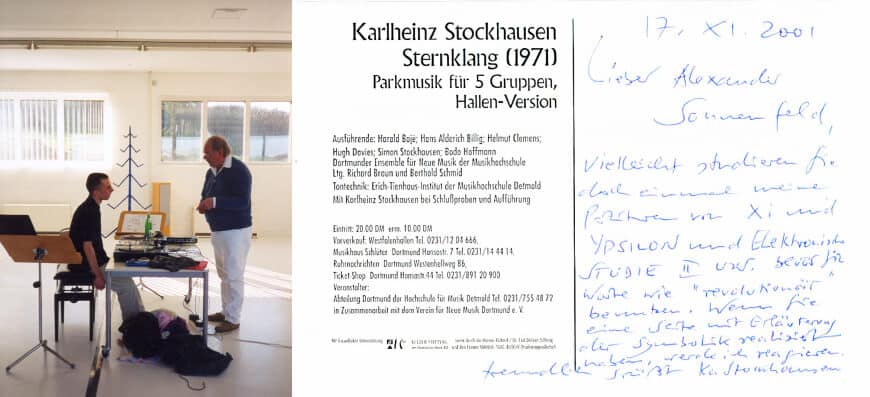- Location: Glad-House / Cottbus
- Date: 4-5 February 2004
- Artists: Die Klöten, Bushido, Sido, Fler, Kost`n Osten, Marusha, Aggro Berlin Phaderheadz, Tanith, Jackfruit, Marc Hype, Andre Langenfeld
The origin of the Sample Music Festival dates back to the year 1986 when a 7 year old boy named Alex Sonnenfeld visited the public music conservatory in Cottbus, Germany to learn a musical instrument.
After being shown a violin to play on it, he quickly became bored. This instrument always sounded the same and the tone was somehow sad to him. In his childish naivety, Alex dreamed of being able to play any instrument in the world … just ANYTHING. Was this a fantasy? Years later, this dream became reality when Alex discovered that turntables were being used as musical instruments to create new and exciting sounds. He eagerly became immersed in this artform and spent years learning “scratching & beat-juggling” techniques. While doing this, he pondered “what actually defined a musical instrument as such?” He saw the solution to this riddle lies in the notation of music – the musicians’ elementary means of communication to convey what is being played.
So at the age of 17, Alex began self-study and searched through all kinds of books on music theory at his local library. To his astonishment, he found nothing in any book about a turntable being used as a musical instrument and no mention of the acoustic result of recorded sound (sample) being played backwards (the most characteristic feature which distinguishes the art of scratching from any other instrument).
How could this be? The professional judgment of an expert was missing. After seeing a picture of a music professor in a Musicology magazine at the local library, Alex decided to write a letter to try and contact the professor. Much later he learned that this man was one of the most important musicologists of the 21st century – his name was Prof. Karlheinz Stockhausen.
In his letter, Alex described to Prof. Stockhausen “a new kind of musical instrument with which it is possible to play “everything” – every sound, every instrument and every tone in the world”.In his youthful exuberance he also reported to have developed the basics of a musical notation that would be revolutionary and redefine the possibilities of making music. (wink).
A few weeks later, surprisingly, came the professor’s answer. Stockhausen wrote the following sentences to Alex in his reply, “Please study my pieces -Electronic Study 1& 2- before you use such words as “revolutionary””.

On 28.03.2002 it was then so far. In a 90 minute lecture Sonnenfeld explained the basics of turntablism to the professor and presented the fundamentals of S-notation. Stockhausen was visibly impressed and a long-lasting pen friendship developed from it. Until his death in 2007, the professor encouraged Sonnenfeld to develop S-notation and thus acted as a sort of mentor.
At one point Alex asked the professor if the turntable was a real musical instrument? Stockhausen answered with a decisive sentence that laid the foundation for the idea of the Sample Music Festival. “A musical notation alone is not enough. Turntablism must first and foremost legitimize itself through public relations.”
In 2004 Sonnenfeld organized the first event that included workshops, showcases and the presentation of his music theory work on turntablism – the so-called Tonspielzeug-Tage which took place from February 4-5, 2004 in Cottbus/Germany.
Tragically, on the first evening of the event, a momentous stabbing occurred in the audience. As a result, the planned performance of a turntablism score had to be cancelled and the S-notation could not be presented. After this incident, the event concept was on hold for the time being.

Seven years later Alexander Sonnenfeld published the thesis -Theory of Motion- which legitimizes turntablism on the basis of S-notation music theory. This work was sent to various universities and professors, but none responded with interest in presenting this work to a larger audience.
Up to this point scratching was a pure hip hop phenomenon which was rather smiled as an art of noise.
This feedback was very sobering, but Alex was not alone with this problem. In the development of the turntablism and DJ industry were mostly people involved who have no music-academic background.
To create a social acceptance was therefore always an enormous challenge. In order to give all these developers and artists a platform and to get into an interdisciplinary exchange with academics, the SMF was born.
Our mission is therefore: to establish Turntablism, Finger Drumming, Syntablism, Artablism, Datablism and Controllerism on an academic and public stage. Eventually it should be possible to learn these new instrumental forms at state music schools and universities.
This would increase social acceptance and make it easier for many people to turn their passion into a profession. Until then, it is a long way but in 100 years, exactly this idea will be called -classic-!
